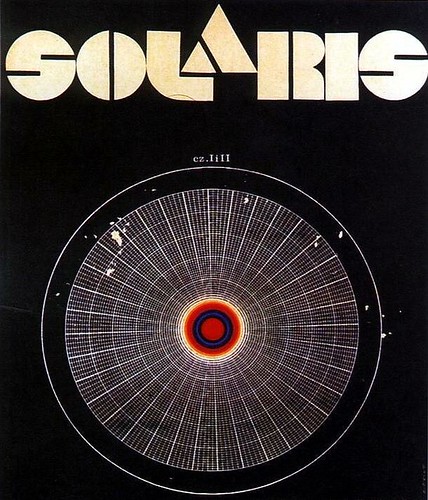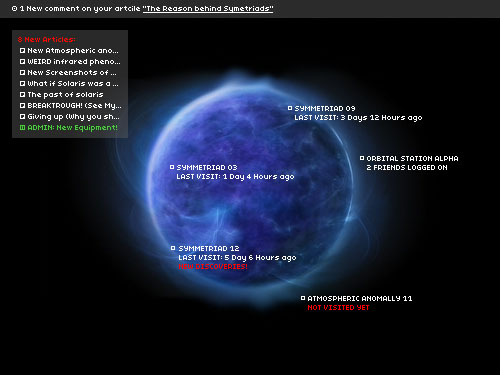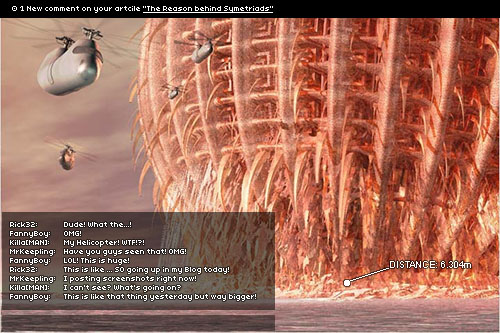Recently Corvus from Man Bytes Blog gave an intriguing task for his newest Round Table: take a book and imagine how a game would look like if that book was based on the game. That’s a mind twister and quite the challenge.
I immediately thought of my favorite and Sci-Fi writer: Stanislaw Lem. I think Lem was one of the brightest minds of our times. Basically, he used the Sci-Fi genre to construct scenarios for analyzing some mind-boggling philosophical paradoxes. The way he was able to bridge the gap between Science and Humanities should be an example for … well everybody. Especially in today’s times, there seem to be a growing separation between the scientific community with their skeptical and analytic way of work and the humanities with an interpretive, relativistic approach. Lem is an excellent example that those two aren’t exclusive and can (and should) be combined to create a better understanding of our world…
Compared to Lem’s books, other Sci-Fi seems like childish, pointless razzle-dazzle with technology. Actually, at some point Lem himself chose not to distance himself from the Sci-Fi community, rejecting an honorary membership offered to him by the Science Fiction Writers of America. He was not only smart but also had some major balls.
One of his best-known works is Solaris. I’m not sure if I would call it his best work but I would rank it pretty high. Many tried to adapt his works into other media and Solaris was made into two movies. As all Lem adaptations, they both failed. They weren’t exactly bad movies. The Tarkovsky one was very artistic and at that time technically impressive. I do like the Soderbergh movie. It has some great production design, great music and is quite bold for a Hollywood flick. It’s just that none of them nails what the book is about.
So as a self-imposed challenge, I tried for some time to come up with an idea for a game based on Solaris. I wanted to finally give Lem’s work the credit it deserves. The recent round table task seems like a good context to share my thoughts with other people.
However, I the movies failed for a good reason. For exactly the same reason, a game might be doomed even more. You see, the book is ultimately all about failure and the limits of human understanding. Lem speculated that if we leave our planet, we might not be able to understand everything we would meet out there. We dream of other worlds and alien life-forms but what we expect are always things very similar to what we already have seen on earth. As he himself put it:
I must tell you, that we have no wish to conquer space at all. We want to extent earth to its utmost limits. We don’t know what to do with other worlds, we don’t need other worlds. We need a mirror.
Lem actually spoiled me EVERY other Sci-Fi right there. Each time I see yet another humanoid alien in Star Trek or Star Wars, I can’t forget those words.
In Solaris, Humanity meets a REAL alien life-form (or “something”) and just completely fails to communicate or learn anything from it. The whole books shows the struggles of the crew to solve one of the peculiar riddles of the anomaly. In-between, we get glimpses into the scientific discussion and development by thousands who already tried to understand the phenomenon many years before. Even though the crew manages to “resolve” the acute situation in the end, they are no more smarter than they were at the beginning. The final scene could be interpreted that the protagonist basically gives up and accepts that the alien will forever be no closer to him than now.
Both Solaris movies avoided that difficult topic. Failure is not really something that goes well in a movie, especially not a Hollywood production. Or rather – failure can work but only as a tragedy; A meaningful failure. Simply giving up is quite unsatisfying. That’s why both movies always added something in the end. The Tarkovsky one is a nice, crazy (but pointless) plot twist in the very last second. Soderbergh took upon that and even added a happy end, showing a first contact scene which Lem denied us.
So how would I make it RIGHT this time?
I thought about an MMOG where players can freely explore Solaris. New content would be added manually or procedurally. Players could take pictures, add tags and post then on a Wiki/Social Network Site. They could then discuss theories on what Solaris is. There could be some simple puzzle players could solve together in order to get to more hidden places but ultimately, they should deliver more new questions than answer old ones. In the end, players would indefinitely continue this game of pretend-science until they succumb to the churn rate.
There is one problem with that game: nobody would play such a game if the KNEW there would never be able to solve the game. Sure, you can’t “win” World of Warcraft either but you get a clear sense of progress. Solving puzzles is different from the experience of a MMORPG. Action games are already fun and engaging even before the score is settled. Even if you fail, you often get a sense of how far you got. Puzzles (or rather riddles – Tetris is also a puzzle after all) are very result-centered. The reward comes from figuring things out, not necessary from struggling to get them. A puzzle game where there is no answer will be quite frustrating with no hope of redemption. Players won’t even try if they know the task is futile.
So releasing such game now, after Solaris is already availible as book makes little sense. You would have to refrain from making any reference to the book to keep up the illusion that there is an explanation.
But the idea actually works in the context the round table: imagine if Solaris hasn’t been written yet. There would be this new mysterious MMOG and players would struggle to find out its secret. On after another, they would fail and give up. Some players could get so depressed by the experience that they might actually write something not unlike Solaris.
But that’s not entirely satisfying. In Solaris, the characters face a natural phenomenon. They don’t solve a riddle created by another human. That’s the whole point of the book. The experience of failure to understand a natural phenomenon is very different from failure against the wit of a human game designer. In a way, we have an approximate Solaris MMOG – the TV Series LOST. Many people complain that the producers will never be able to solve the show’s mysteries. The critics don’t blame themselves, they blame the producers.
Genuine failure seems to be in fundamental conflict with what a game is. So seems like what I’m trying to do is impossible. In a double-sense, the Solaris Game is an impossible game and just like the protagonist of Solaris, I have to give up. Do you see any possibility I missed?









Have you read A New Kind of Science, by Stephen Wolfram? His discussion of alien “life” or “intelligence” (one short section in a long book) is probably the most lucid I’ve read, and most similar to what you describe.
I like that idea of setting up expectations (like, here is a puzzle, so it must have a solution) and then showing those expectations to be invalid in the situation you create. I’ve heard that the game The Jackyard does something like that with unsolvable puzzles, but I haven’t been able to get far enough in it to find any.
I think that such a thing could be more than pointless as long as there is some other “point” to find other than the expected one. Like, you may not be able to solve the riddle of what this alien is or whatever, but there is some other thing to get out of the experience. Like, teaching people to look past what is expected or assumed and find meaning elsewhere.
When it comes to natural phenomenon, again thinking back to A New Kind of Science, I think procedural generation, artificial life stuff, could fit well. The core doesn’t have to be human-generated.
I wonder if we could (or should) apply any of this to Adopt an Invader. On that note, did you get the email I sent a few days ago?
Wolfram – mhm, a 1000 page book on Cellular Automata. Nice! I might take a peek into it!
But keep in Mind that Solaris was written in 1961. Back then, Wolfram was 2 years old.
The problem of natural phenomenon vs. wit of the designer is a more fundamental one: if I’m playing a game it is the game designer who (implicitly) suggests that there is a solution by even creating the game in the first place. It doesn’t matter if the puzzle is handcrafted or procedurally generated. The fact that it has been made into a game by a designer remains. And this is why players will repond differently than a hypothetical researcher on Solaris: They will say “There is no solution, this game (and it’s designer) sucks!” instead of “There is no solution, gee there might to be limits to human understanding”. Because it is a game, there is someone to blame. In real life, you wouldn’t have that escape.
Nice choice – Solaris is an outstanding book. I completely agree with your assessment of why the film adaptations necessarily fail. The impossibility of a game is really a logical one. If the point is to get players to realize that there is no way to understand it, then that becomes a way of understanding itself, thereby disrupting the point. But it also could drive home the very human need to create meaning and understanding even if there isn’t one.
I imagine if the events of Solaris were to actually occur it wouldn’t take long before scientists would reach some sort of tacit agreement on what the “planet” is and completely reject any further inquiry into the matter. Naysayers would be relegated to the status of conspiracy theorists and ignored.
I’m reminded of a passage from House of Leaves (which I thought about blogging for the Round Table but it just doesn’t seem possible):
“Riddles: they either delight or torment. Their delight lies in solutions. Answers provide bright moments of comprehension perfectly suited for children who still inhabit a world where solutions are readily available. Implicit in the riddle’s form is a promise that the rest of the world resolves just as easily…
The adult world, however, produces riddles of a different variety. They do not have answers and are often called enigmas or paradoxes. Still the old hint of the riddle’s form corrupts these questions by re-echoing the most fundamental lesson: there must be an answer. From there comes torment.”
Yes, A New Kind of Science is worth looking at. Perhaps you could start here: http://www.wolframscience.com/nksonline/page-825
Perhaps you could start here: http://www.wolframscience.com/nksonline/page-825
I see the problem now with having a game designer. The way I’d approach it is to make the game about some other goal, with the (unsolvable) riddle as a side issue, that players may discover and pursue (or not) as they wish. They may still choose to blame the game designer, but I imagine that fewer people would do so. For example, in the Solaris game, the players may be on the planet for some commercial mission, but can also investigate the alien existence there if they choose.
Interesting points, Kylie Prymus. It seems like there could be a lot of potential in exploring riddle and paradox in games.
Just realized – there’s a game that is kind of similar here, by the RRRR group. Go to their about page and scroll down to the description for “Please the Art Critic” :p
http://www.rrrrthats5rs.com/about/
@Kylie: Thanks for that quote! It’s an a perfect match for this topic. Amazing!
I agree that a real Soliars might not receive that kind of attention. That’s how the Pluto case was solved anyhow – you just invent a new category and continue. But on the other hand, things might get different when we start actually going to all that far away places. So far, the furthest man was from earth was the moon and even that was only temporary.
@having some other goal – good idea! Might work. Would be somewhat like Alpha Centauri. My only concern would be that it might distract from the message if you make that alternative task to engaging.
@Please the Art Critic – I don’t know about that. They say you can’t win the first 12 times but I have been able to beat the first level on my second try. They have some EXCELLENT collection of games on their Website though! Thanks for that link, great source for inspiration.
@having some other goal – I wouldn’t be too worried about players getting caught up in the other games and missing the point. In fact, I would count on it! They will move on to the other tasks and stop caring about understanding the planet, which is itself an object lesson.
We’d rather deal with that which we (think we) understand. Few people have the tenacity to continue to poke and prod at something in hopes of understanding it even if they never will. At least if those other “goals” are there they would continue to play the game (rather than just quit playing) which gives the the opportunity to reflect, on occasion, on that particular task/puzzle (the planet) which they refuse to explore. If they stop playing the game then it will no longer call to them, beckoning them to at least admit that they refuse to engage with something so far outside their established parameters of meaning.
@Kylie: Good point about opportunities for reflection. Haven’t thought about that!
I wonder what this goal could be, then. I initially thought somewhere along the lines of a 4x. But now that you mentioned opportunities for reflection, I thought maybe of a tourist game like Shadow of the Colosus or Endless Ocean. In Endless Ocean, one of the goals is to visit every spot on the map at least once. I thought that worked very well.
Yes, I also agree with what you’re saying, Kylie. Maybe this kind of game could be more feasible than we (Krystian) thought?
About the goal, I wasn’t thinking 4x (fourecks?) so much as a typical game where you have one limited avatar, like a shooter or something (Space Invaders?) or maybe a space resource-harvesting game (Motherload?)… And if you give it a tourist-y flavor, even better.
Not sure if you saw this in the description for Please the Art Critic, but my point was that it is an example of a game where you try to understand a system that is impossible to understand. And that players did not give up in frustration and despair quite to the degree that you had feared. Instead, they believed they understood more than they really did.
“The critic asks you to draw things and decides if what you made was good enough, but unlike most games the probability of him approving is random. Instead of the yes-or-no deterministic games everywhere, can people realize when a game is ruled by chance? No one in the comments seemed to notice, only complaining that once it was beaten there was no replay value.”
What do you think of that?
I think shooting would go against Lem’s conventions. Motherload-esque: maybe. But it would have to be less cartoony.
As for the Art Critic description – that’s what confused me. It says that the system is random but when I play it, the critic clearly tells me what I did wrong. If I do the picture according to his demands (using certain colors, shapes), it works. Maybe it gets more random later on?
In any case – since you CAN win, people don’t bother if there is reason behind it or not. It would be different if not only understanding but also winning was impossible.
Great experiment nonetheless…
I just finished reading Solaris.
Not sure what to say right now.
Not sure what to say right now.
Is it different from what you’ve expected?
No, it’s about what I expected.
I wanted to let you know that I had read it, but at the time I couldn’t express what I felt or thought about it in only a sentence or two.
Definitely worth reading. Left me with a similar taste as Lord of the Flies, I’d say.
I would like to see a game like that. I do think it would be worth pursuing at some point in time.
I’m glad I was able to persuade you to read it. ^_^